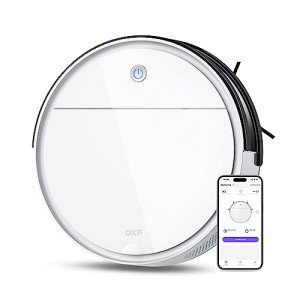Robot Vacuum Cleaners: The Future of Home Cleaning
In today's hectic world, where time frequently comes at a premium, robot vacuum have actually become a game-changer in household maintenance. Designed to automate the tedious job of vacuuming, these home appliances continue to get appeal amongst property owners looking for benefit and effectiveness. This post explores the different aspects of robot vacuum cleaners, highlighting their functions, benefits, and the elements to think about before buying one.
What is a Robot Vacuum Cleaner?
Robot vacuum are autonomous gadgets that navigate throughout the home, utilizing sensing units and navigation technologies to tidy floorings while reducing human intervention. Unlike conventional vacuum cleaners, robot vacuums are designed to operate independently, going back to their charging station when they require to dock and recharge. The combination of smart innovation also allows these gadgets to be controlled via smartphone applications or clever home systems.
Functions of Robot Vacuum Cleaners
The abilities of robot vacuum have expanded substantially throughout the years. Here are some common features discovered in modern designs:
- Suction Power: Varies amongst models, with some delivering high suction for deep cleaning carpets.
- Navigation Technology:
- Lidar (Light Detection and Ranging)
- Camera-based navigation
- Gyroscope sensing units
- Smart Home Integration: Compatible with virtual assistants like Amazon Alexa and Google Assistant.
- Set up Cleaning: Allows users to set particular times for the vacuum to operate autonomously.
- Self-Emptying Dust Bins: Some models include a base that instantly empties the gadget's dustbin.
- Multi-Surface Capability: Suitable for both carpets and difficult floorings.
- Anti-Tangle Design: Brushes that decrease contending hair or strings.
- Virtual Boundaries: Users can set barriers so that the robot prevents particular areas or rooms.
Benefits of Using Robot Vacuum Cleaners
The appeal of robot vacuum cleaners can be credited to several key advantages:
- Time-Saving: Automating the vacuuming process maximizes valuable time.
- Efficient Cleaning: Many robot vacuums can reach under furniture where traditional vacuums might have a hard time.
- Consistency: Robot vacuums can be programmed to clean routinely, making sure that spaces are preserved without much effort.
- Smart Features: The ability to schedule cleansings or manage the gadget by means of an app enhances user convenience.
- Adaptability: Most designs can changing cleaning methods based upon the surface type.
Factors to consider When Choosing a Robot Vacuum Cleaner
Despite their numerous benefits, prospective purchasers ought to think about several factors to guarantee they choose the right robot vacuum cleaner for their requirements:
- Home Size and Layout: Larger homes might need models with powerful batteries and advanced navigation.
- Kind of Flooring: Some designs perform better on carpets, while others stand out on tough floorings.
- Pets: Homeowners with family pets should look for models developed to handle family pet hair and dander.
- Budget plan: Robot vacuums vary extensively in price, from budget models to high-end devices with sophisticated functions.
- Upkeep: Consider the cost of changing filters and brushes, and the ease of cleaning the device itself.
- Sound Level: Some models run quietly while others can be disruptive during cleaning cycles.
Popular Robot Vacuum Models
To help potential buyers, the following table details some popular robot vacuum designs alongside their essential features and price varieties:
| Model | Suction Power | Navigation Type | Smart Home Compatible | Typical Price |
|---|---|---|---|---|
| iRobot Roomba i7+ | High | Lidar + Camera | Yes | ₤ 799 |
| Roborock S7 | Moderate | Lidar | Yes | ₤ 649 |
| Neato D7 Overview | High | Laser Navigation | Yes | ₤ 649 |
| Eufy RoboVac 11S | Moderate | Standard Sensors | No | ₤ 239 |
| Shark IQ Robot | Moderate | Camera + Sensors | Yes | ₤ 499 |
Regularly Asked Questions (FAQs)
1. Can robot vacuum cleaners clean up all types of surface areas?Yes, many modern robot vacuum cleaners are designed to deal with a variety of surfaces, including carpets, tile, and wood floors. However, it is a good idea to examine the specifications of private models as some might be much better matched for specific surface areas.
2. For how long does a robot vacuum operate on a single charge?The battery life of robot vacuum cleaners varies by model, generally lasting anywhere from 60 to 120 minutes. Larger homes with more square video might need models with extended battery life.
3. Do robot hoover and mop require a lot of maintenance?Maintenance requirements depend on the design, however the majority of require occasional emptying of the dustbin, cleaning of brushes, and replacement of filters. Some models include self-emptying bases that lower maintenance.
4. Are robot vacuums reliable at getting animal hair?Lots of robot vacuums include specialized brushes and powerful suction designed specifically for animal hair. Those especially suited for family pet owners can efficiently handle hair and dander.
5. Can robot vacuum cleaners map my home?Lots of advanced models come equipped with mapping innovation, enabling them to produce a design of your home for more efficient cleaning. This feature can also enable users to set virtual limits.
As innovation continues to progress, robot vacuum cleaners are expected to become much more advanced, offering enhanced cleaning abilities and clever features. They serve as valuable tools for anybody aiming to maintain a tidy home with minimal effort. By comprehending the different features, advantages, and factors to consider related to picking a robot vacuum cleaner, customers can make educated decisions to find the very best fit for their cleaning needs. Welcoming this innovation not only simplifies household chores but also leads the way for a cleaner, more arranged living space.

